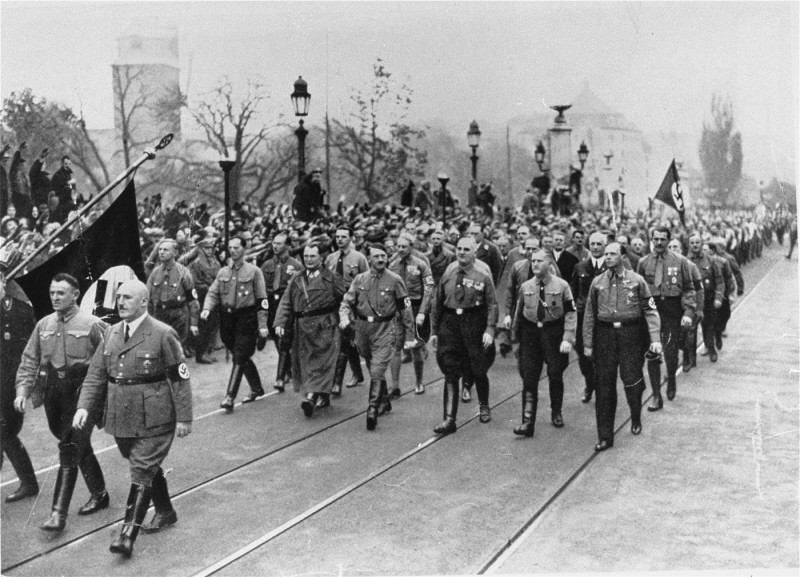
Julius Streicher: Biography
Julius Streicher Julius Streicher (1885–1946) was a German politician and publisher of antisemitic tracts.
Born on February 12, 1885, in the Bavarian town of Fleinhausen, Julius Streicher began his career as an elementary school teacher. In 1909, he undertook a post as a teacher and administrator at a school in the Franconian city of Nuremberg, a region with which in Nazi times he became closely associated.
With the outbreak of World War I, Streicher immediately enlisted. He served for the entirety of the war and he was highly decorated. The trauma of Germany's defeat and the turmoil of the immediate interwar years drove Streicher to radical political activity. In 1919, he joined the Schutz-und-Trutz Bund (Society for Defense and Protective Action), a right-wing association agitating against the newly founded socialist Bavarian Republic; here, for the first time, Streicher displayed the fierce antisemitic rhetoric for which he would later become notorious. Soon thereafter, he helped to found the Nuremberg wing of the Deutschsozialistische Partei (German Socialist Party), which, despite reference to socialism in its name, espoused right-wing ultra-nationalist, anti-Catholic, and antisemitic principles.
In 1922, Streicher persuaded his personal followers to merge with the fledgling National Socialist German Workers' Party (Nationalsozialistische Deutsche Arbeiterpartei). As one of the Nazi party's earliest members, he could count himself among the oldest of the Nazi “old guard.”
In 1923, Streicher established his virulently antisemitic newspaper, Der Stürmer (The Attacker). In the same year, Streicher took part in Adolf Hitler's abortive Beer Hall Putsch. For these activities Streicher was suspended from his teaching post and spent the following years leading a surrogate local organization of the outlawed Nazi Party. Between 1924 and 1932 he held a seat in the Bavarian parliament.
Following Hitler's release from prison, the Nazi leader named Streicher Gauleiter (district leader) of Middle Franconia (later Franconia). In the first months of the National Socialist regime, Streicher chaired the Central Committee to Repulse Jewish Atrocity and Boycott Agitation (Zentralkomitee zur Abwehr der jüdischen Greuel- und Boykotthetze). In this capacity, he helped to organize the famous one-day boycott of Jewish businesses on April 1, 1933. Although Streicher's April 1 boycott effort was ultimately less productive than hoped, it formed the basis for a more enduring boycott movement of Jewish shops and businesses throughout the 1930s, based on local initiative.
In 1938, Streicher's Stürmer reached its highpoint in terms of circulation; his successful publishing house of the same name (Stürmer-Verlag) produced among other works, a host of antisemitic children's literature, including the infamous Giftpilz (The Poisonous Mushroom).
Despite the “success” of his Stürmer and his strong personal association with Hitler, who valued him as a protégé, Streicher was often viewed as volatile and mercurial by leading officials. While useful as a purveyor of virulent and often prurient antisemitism to the German masses, he had enemies in party circles. His disagreeable temperament, reckless ambition, and overzealous self-enrichment, principally from Jewish property seized or “purchased” during “Aryanization” efforts, made him enemies in party circles. After a 1939 incident in which he tried publicly to humiliate Reich Marshall Hermann Goering, the Supreme Nazi Party Court pronounced Streicher “unfit for leadership” and stripped him of his party posts. Streicher's Stürmer, which was not technically a party publication, continued to be published.
In May 1945, Streicher was captured by US forces, and convicted on the charge of crimes against humanity in a trial of major war criminals before the International Military Tribunal at Nuremberg (IMT). He was hanged in Nuremberg, his former stronghold, on October 16, 1946.
Critical Thinking Questions
- Is there a direct link between words and actions? Can words and images inspire people to commit acts of genocide?
- What pressures and motivations may have affected Streicher's choices before and during the war?
- How were various professions involved in implementing Nazi policies and ideology? What lessons can be considered for contemporary professionals?